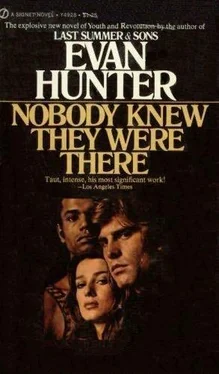Evan Hunter - Nobody Knew They Were There
Здесь есть возможность читать онлайн «Evan Hunter - Nobody Knew They Were There» весь текст электронной книги совершенно бесплатно (целиком полную версию без сокращений). В некоторых случаях можно слушать аудио, скачать через торрент в формате fb2 и присутствует краткое содержание. Город: New York, Год выпуска: 1971, ISBN: 1971, Издательство: Doubleday & Company, Жанр: Проза, на английском языке. Описание произведения, (предисловие) а так же отзывы посетителей доступны на портале библиотеки ЛибКат.
- Название:Nobody Knew They Were There
- Автор:
- Издательство:Doubleday & Company
- Жанр:
- Год:1971
- Город:New York
- ISBN:978-0094575004
- Рейтинг книги:4 / 5. Голосов: 1
-
Избранное:Добавить в избранное
- Отзывы:
-
Ваша оценка:
- 80
- 1
- 2
- 3
- 4
- 5
Nobody Knew They Were There: краткое содержание, описание и аннотация
Предлагаем к чтению аннотацию, описание, краткое содержание или предисловие (зависит от того, что написал сам автор книги «Nobody Knew They Were There»). Если вы не нашли необходимую информацию о книге — напишите в комментариях, мы постараемся отыскать её.
Nobody Knew They Were There — читать онлайн бесплатно полную книгу (весь текст) целиком
Ниже представлен текст книги, разбитый по страницам. Система сохранения места последней прочитанной страницы, позволяет с удобством читать онлайн бесплатно книгу «Nobody Knew They Were There», без необходимости каждый раз заново искать на чём Вы остановились. Поставьте закладку, и сможете в любой момент перейти на страницу, на которой закончили чтение.
Интервал:
Закладка:
“After all,” he tells me seriously while I envision him beating a naked Jean Trench in a student apartment somewhere off campus, “after all, if public figures publicly announce in their music and in their life styles that they are experimenting with mind-blowing drugs, will not their idolatrous fans seek to emulate their postures, hunh?”
“What this party could use,” a voice at my elbow says, “is a little pot,” and I turn to find the black girl in the turtleneck shirt and faded jeans standing at my side and reaching for my bottle of scotch.
“Take this young lady,” Koblenz says, his eyes coveting her. “You’ll notice, for example, that she’s not wearing a brassiere.”
“ Can you notice?” the girl says, pouring scotch. “I’m Adele.”
“Hello, Adele,” I say. “I’m Arthur.”
“Of course you can,” Koblenz says. “But ten years ago, this same young lady. how old are you, Adele?”
“Twenty-four,” Adele says. “Cheers,” she says and lifts the glass and drinks.
“A twenty-four-year-old girl would never have dreamt of walking around in such an exposed manner.”
“Sure, we would have.”
“In 1964? Never.”
“Anyway, who’s exposed?” Adele asks. “I’m free , is all.”
“Nobody’s free,” Jean says, and immediately adds, “I still wear a bra.”
“Really, honey?” Adele asks. “How come?”
“I like secrets,” Jean says.
“There are no more secrets in America,” Adele says. “You think there are any secrets, Arthur?”
“A few,” I say.
“Name one.”
“If I name it, it won’t be a secret any more,” I say, and smile.
“You’re too smart for me, Whitey,” Adele says, and goes off to join a group on the other side of the room.
(In the room, the women come and go, talking of Michelangelo. I look up at the clock. Where is Sara?)
In the other room, Seth Wilson tells me there are only six important writers in America, and he goes on to name them. He also tells me he is going to be more important than any of them because, aside from his obvious talent (he was chosen for the writer-in-residence fellowship over six hundred other applicants from all over the country), he had the added advantage of being black and theretofore able to deal with America’s problems as revealed through its polarization into two separate and distinct nations….
“White and black?” I ask.
“No, Immigrant and Wasp,” he says. “Now those are broad generalizations, I know,” he says, “but I think we can safely conclude that there are two Americas side by side today and that one of them is Immigrant America, in which category we can locate black people and young people, and the other is Wasp America, where we can locate the Establishment and all previous immigrant groups that have been assimilated into the culture.” He goes on to tell me that of course these categories can be divided and subdivided, as for example, the long-haired youths and the straights, the militant blacks and the integrationists, the long-arrived immigrant-now-Wasp groups like Italians and Irishmen and Jews and the newly arrived Wasp contenders like Puerto Ricans (“Have you noticed,” he asks in an aside, “that the only men to set foot on the moon so far have been Wasps?”), but that essentially the categories are valid and true, and he is possibly the one talented writer around who can straddle both Americas, being black and young and therefore Immigrant both emotionally and of course by heritage, but being Wasp intellectually and creatively.
“You are also quite modest,” I mention.
He does not laugh. He does not even smile.
The blonde named Lucille tells me she has been playing piano since she was six years old, that she had a strict piano teacher who beat out the cadence on the piano top with a cane she carried because she had suffered polio as a child. She would clutch the piano top with one gnarled hand (she also had arthritis, poor soul) and rap out the tempo with the cane while Lucille, in terror, kept wishing she would fall over and break her neck, thereby adding to her miseries. Lucille confides that her entire life has been a series of severe training episodes. She was, for example, toilet-trained at the age of eight months, which she supposes sets some kind of record, though when anyone makes her laugh hard enough, she still wets her pants.
“I had better not make you laugh,” I say.
“I doubt if you could,” she tells me. “I have no sense of humor.”
“I saw you laughing earlier,” I say. “With Davey.”
“No. Davey was laughing. I was showing him a chord that group uses over and over again.”
“I saw you laughing, too.”
“That wasn’t when I was showing the chord to Davey.”
“I thought it was.”
“No, it wasn’t,” Lucille says. “I have total recall.”
“So have I.”
“One of us is wrong.”
“It must be me,” I say, and go to sit at the piano alone.
I have had this American party scene, I have had it in a hundred different homes on a thousand different occasions (total recall), and there is nothing different about this one. The settings change, the faces change, the costumes change, the ages change, the music changes, but they are all one and the same, and I am bored to tears with each and all. I am amazed only that it is possible for the party to continue with such unabated energy. I can forgive myself — I have always been magnanimous that way — because I am here to do something. But what of the others? Will the party go on and on (with the same stale smoke and canned music and forced laughter and pointless conversations) until one bloody dawn a year from now, two years from now, ten years from now, when all the revelers will stagger out into the streets and ask themselves where they were while it all was happening? We were talking, they will say. We were laughing. We were singing. It was too painful to do otherwise. Anyway, we were only following the historic precedent set by countless nations. We did not know what was going on out here during the night. We were inside where it was warm and protected, and friends gave tolerant respect to opinions earnestly expressed. We laughed a lot. We sang sometimes. We danced and joked and listened and forgot. We did not know what was happening outside here, we did not expect so shattering a dawn, we only wanted to spend a pleasant hour or so together. Sitting before an upright piano whose strings vibrate with the tumultuous sound coming from the record player, I listen, and I watch, a drink in my hand (always a drink in my hand, always and ever the same), the smoke rising, the chatter floating, the music throbbing. I am essentially alone, an outsider, but I wonder — for all my magnanimity — if I can really forgive myself.
I suddenly know why I am here.
To kill a man.
Yes, but I have known that all along.
I ask myself the question again: Why are you here? Drowning in sound, trying in this ocean of sound to find a meaningful straw of dialogue to which I can cling, I hear instead the same endless chatter about Updike and all that crowd, Bernstein and all that crowd, our beloved loyal leader and all that crowd, God help us, and I am here with all my crowd (but not my crowd) and very close to panic, very close to losing complete control and exposing either the plot or myself (Freud and all that crowd) because I can only think I am here to kill a man and the answer does not satisfy me, the answer is as repetitive and as dull as the party that engulfs me.
She throws open the front door as though expecting a surprise.
She is wearing her long black coat and a black woolen hat. She takes off the coat immediately, draping it over the extended leg of the boy in the cast, revealing at once that she is draped in beads, yards and yards of beads that twinkle and gleam over black slacks and black sweater, short strands of beads that bounce between her breasts, longer strands that fall to her waist, still longer ropes that dangle to her knees, beads in every conceivable color and size, some as large as golf balls, some as tiny as tears, she is aglow in a swirl of color and motion, an open glittering treasure chest, a fantasy reborn.
Читать дальшеИнтервал:
Закладка:
Похожие книги на «Nobody Knew They Were There»
Представляем Вашему вниманию похожие книги на «Nobody Knew They Were There» списком для выбора. Мы отобрали схожую по названию и смыслу литературу в надежде предоставить читателям больше вариантов отыскать новые, интересные, ещё непрочитанные произведения.
Обсуждение, отзывы о книге «Nobody Knew They Were There» и просто собственные мнения читателей. Оставьте ваши комментарии, напишите, что Вы думаете о произведении, его смысле или главных героях. Укажите что конкретно понравилось, а что нет, и почему Вы так считаете.












